Comprehensive Mosquito Control in Northern Virginia
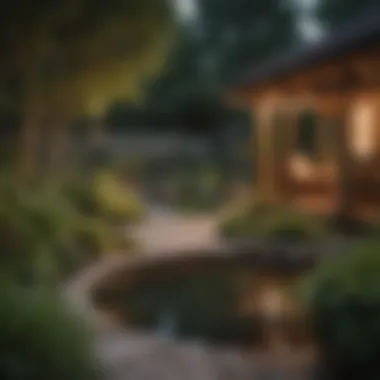

Intro
Mosquito control is a crucial aspect of maintaining a healthy and comfortable environment. In Northern Virginia, the presence of mosquitoes can pose significant challenges, from health risks to disruptions in outdoor activities. Mosquito Shield, a leading provider in the region, offers a multifaceted approach to address these issues. This article delves into their strategies, technologies, and best practices regarding mosquito management. We will explore the behavior of mosquitoes, potential health implications, and effective methodologies for pest management. Furthermore, we will analyze local environmental considerations and compare professional services with DIY options.
Pest Identification
Identifying pests is the first step in effective mosquito control. Understanding the various types of mosquitoes prevalent in Northern Virginia allows homeowners to take appropriate measures and recognize signs of infestations.
Detailed descriptions of common pests
In Northern Virginia, two notable species of mosquitoes dominate: the Eastern Encephalitis mosquito and the Asian Tiger mosquito.
- Eastern Encephalitis mosquito: This species is known for its aggressive behavior and can transmit diseases such as Eastern Equine Encephalitis. Its appearance features dark markings on its body and long legs.
- Asian Tiger mosquito: Easily recognized by its black and white striped body, this mosquito is also a significant vector for diseases like West Nile virus and Zika virus. They are most active during the day, making them particularly troublesome.
Signs and symptoms of infestations
Detecting a mosquito problem early can help mitigate larger issues. Signs may include:
- Frequent mosquito bites that lead to discomfort or rashes.
- Increased mosquito activity during warm months, especially near standing water.
- Sounds of buzzing indoors or around the yard.
- More significant presence of mosquitoes compared to previous years.
Prevention Strategies
Preventing mosquito infestations requires a combination of home maintenance and natural deterrents. Below are several strategies to help keep your home mosquito-free.
Home maintenance tips for pest prevention
Simple actions can significantly reduce mosquito populations. Suggestions include:
- Eliminate standing water: Regularly check and remove sources of stagnant water, such as flower pots, bird baths, and clogged gutters.
- Maintain landscaping: Keep bushes and grass trimmed, as overgrowth can serve as a breeding ground.
- Install screens: Check window and door screens for holes and replace them as necessary.
Natural deterrents and barriers
Using natural repellents can help keep mosquitoes at bay without harmful chemicals. Options to consider include:
- Citronella candles and torches: These can create a localized area free from mosquitoes.
- Essential oils: Oils such as lavender and eucalyptus can repel mosquitoes when applied topically or used in diffusers.
- Planting: Consider growing mosquito-repellent plants like lemon balm or marigolds in your yard.
Treatment Options
When preventive measures fail, treatment options become essential. Understanding the differences in chemical and natural treatments is crucial in making informed decisions.
Overview of chemical vs. natural treatments
Chemical options often involve pesticides that target mosquito larvae and adult levels. However, these can have effects on local ecosystems. Natural treatments, on the other hand, use essential oils or other organic methods, to reduce mosquito populations.
Step-by-step guides for DIY treatments
For homeowners interested in managing mosquitoes on their own, here are some simple DIY methods:
- Create a mosquito trap: Use a container filled with beer or sugar water to attract and trap mosquitoes.
- Make a repellent spray: Combine water with essential oils like tea tree or peppermint in a spray bottle and apply to exposed skin.
- Set up barriers: Hang mosquito netting around seating areas for protection during outdoor gatherings.
Professional mosquito control services can provide more comprehensive solutions, offering treatments tailored to your specific environment and needs.
Feel free to explore more about mosquito control strategies through resources such as Wikipedia or visit Britannica for additional insights.
Intro to Mosquito Control
Mosquito control is an essential aspect of maintaining public health and comfort, especially in regions like Northern Virginia where warm climates can lead to increased mosquito populations. This section aims to provide a foundational understanding of the why and how behind effective mosquito management, shedding light on the techniques that contribute to reducing mosquito-borne illnesses and enhancing the quality of life for homeowners.
Importance of Effective Mosquito Management
The significance of effective mosquito management cannot be understated. Mosquitoes are known vectors for various diseases, including West Nile virus, Zika virus, and Dengue fever. These illnesses represent serious health risks that can affect individuals of all ages. Effective management acknowledges not only the need to eliminate mosquitoes but also to target specific breeding areas, thereby reducing population growth.
Furthermore, successful mosquito control strategies lead to a more enjoyable outdoor experience for families and communities. By managing mosquito populations, homeowners can feel at ease while tending to gardens, hosting gatherings, or simply enjoying their yards. This also fosters a sense of community, as effective management helps to protect everyone's health.
In addition, effective mosquito management assists in preserving local ecosystems. By utilizing appropriate methods, communities can mitigate the impact on beneficial insect populations and maintain biodiversity. This balance is critical in creating a sustainable environment.
Overview of Mosquito Shield
Mosquito Shield is a prominent service provider in Northern Virginia specializing in mosquito control. The company focuses on utilizing advanced techniques to manage mosquito populations effectively. Their approach encompasses a blend of traditional pest control measures and innovative solutions, ensuring comprehensive removal of mosquitoes throughout the season.
The company prides itself on understanding local mosquito behavior. This includes recognizing breeding habits and preferred outdoor locations. As a result, their treatment plans are highly tailored to specific residential needs, ensuring optimal effectiveness. Customers can expect a systematic evaluation of their properties, allowing for targeted strategies that yield long-term results.
Mosquito Shield also emphasizes customer education. They provide insights and resources for homeowners about prevention tactics and maintaining a mosquito-free environment. This empowers individuals to partake actively in mosquito control, which can amplify the efficacy of professional services.
"Effective management strategies are key to reducing health risks associated with mosquitoes and fostering a more enjoyable outdoor experience."
In summary, the blend of Mosquito Shield's expertise and community engagement forms a critical component of successful mosquito control in Northern Virginia. Understanding these strategies lays the groundwork for a deeper discussion on mosquito behavior, health risks, and pest management methodologies employed in the region.
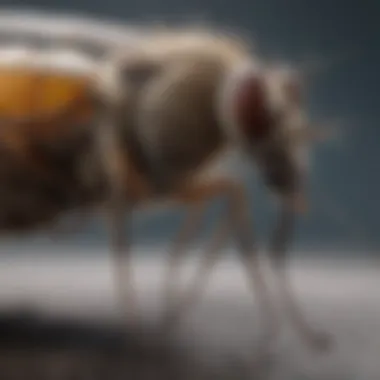
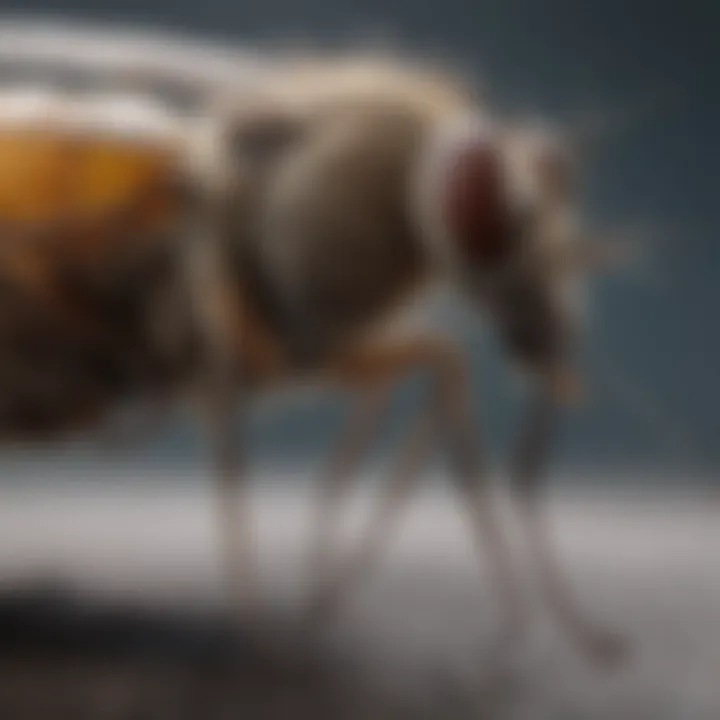
Understanding Mosquito Behavior
Understanding mosquito behavior is crucial for effective pest management in any region, including Northern Virginia. Recognizing how these insects live, feed, and breed provides a foundation for developing targeted control strategies. Knowledge of their habits informs not only when to take preventive measures but also which treatments are most effective. Mosquitoes are not just a nuisance; they play a role in the ecosystem, and understanding their behavior helps mitigate their impact on homeowners and the community.
Life Cycle of a Mosquito
The life cycle of a mosquito consists of four distinct stages: egg, larva, pupa, and adult. The entire cycle can be relatively short, often completing in seven to ten days, depending on environmental conditions such as temperature and humidity.
- Eggs: Female mosquitoes typically lay their eggs in stagnant water or on moist surfaces.
- Larvae: Once the eggs hatch, larvae emerge and thrive in water. They feed on organic matter and develop through several stages, known as instars.
- Pupae: After the larval stages, mosquitoes enter the pupal stage. This is a transitional phase where they do not feed and prepare to become adults.
- Adults: Finally, fully developed adult mosquitoes emerge from the pupae. Males usually emerge first and feed on nectar, while females require blood meals for egg development.
Understanding this cycle allows homeowners to take action at various stages, particularly targeting the water source where mosquitoes breed.
Feeding Habits and Patterns
Mosquitoes primarily feed on nectar for energy but require protein from blood to produce eggs. This feeding behavior influences their activity patterns.
- Time of Day: Many species are most active during dawn and dusk, while some prefer night-time. Understanding these patterns helps in planning outdoor activities.
- Attractants: Carbon dioxide, heat, and certain scents can attract mosquitoes. Knowing this can assist in minimizing exposure, especially in residential areas.
By being aware of these feeding habits, homeowners can implement measures to reduce their attractiveness to mosquitoes, such as using repellent or avoiding strong fragrances outdoors.
Breeding Sites in Northern Virginia
In Northern Virginia, mosquitoes favor certain breeding sites, primarily stagnant water. Common breeding grounds include:
- Puddles: After rain, small puddles can create ideal breeding spots for mosquitoes.
- Birdbaths: Stagnant water in birdbaths should be changed regularly to disrupt the mosquito life cycle.
- Flowerpots: Water accumulation in trays under flowerpots can serve as breeding sites.
Homeowners should regularly inspect their property for potential breeding sites. Eliminating standing water is an effective first step in mosquito control.
In summary, understanding mosquito behavior is key to effective management. By recognizing their life cycle, feeding habits, and preferred breeding sites, homeowners can take proactive measures to minimize mosquito populations and protect themselves from potential health risks.
Health Risks Associated with Mosquitoes
Understanding the health risks linked to mosquitoes is crucial for residents in Northern Virginia. These insects do more than just cause annoyances; they are potential carriers of serious diseases. Being informed about the risks can motivate homeowners to take action for their safety and the well-being of their families.
Common Diseases Transmitted by Mosquitoes
Mosquitoes are known vectors for various infectious diseases that affect humans. Some of the most common diseases transmitted by mosquitoes include:
- West Nile Virus: This virus can cause severe neurological diseases. It is often transmitted by the Culex mosquito. Symptoms can range from mild headaches to serious conditions requiring hospitalization.
- Zika Virus: Although often mild, Zika can lead to serious birth defects if a pregnant woman contracts it. The Aedes mosquito typically spreads Zika.
- Dengue Fever: Often seen in tropical and subtropical regions, dengue is transmitted primarily by Aedes mosquitoes. Symptoms include high fever, severe headaches, and joint pain.
- Malaria: While not as common in the U.S., malaria remains a significant problem in many parts of the world. It is transmitted by Anopheles mosquitoes.
Awareness of these diseases is essential for mitigating risks and fostering a proactive approach to mosquito control.
Impact on Public Health
The impact of mosquito-borne diseases on public health cannot be overstated. These diseases lead to thousands of hospitalizations and even deaths each year. They also strain healthcare systems. Here are some aspects to consider:
- Economic Burden: Treating mosquito-borne diseases can be expensive. The costs include direct medical expenses and indirect costs from loss of productivity and long-term disability.
- Public Awareness Campaigns: Health departments often initiate campaigns to educate the population about prevention methods. Raising awareness is vital to reduce transmission rates.
- Community Health Services: Local governments may focus on community health services to monitor and control mosquito populations. Such initiatives are essential for minimizing the risks associated with these diseases.
A strong public health response is critical to manage these threats effectively.
Vulnerable Populations
Certain groups face higher risks from mosquito-borne diseases. Identifying these vulnerable populations helps in tailoring preventive measures. The groups at higher risk include:
- Children: Young children may have weaker immune systems, making them more susceptible to infections. Preventative measures in their play areas are crucial.
- Elderly: Older adults often have pre-existing health conditions that can be exacerbated by diseases transmitted by mosquitoes. Extra precautions are necessary for their living environments.
- Pregnant Women: As noted earlier, pregnant women risk passing on infections like Zika to their fetuses. It is vital for them to take extra care in mosquito-prone areas.
"Proactive measures can significantly reduce the risk of mosquito-borne diseases among vulnerable populations."
In summary, recognizing the health risks associated with mosquitoes underscores the importance of effective mosquito management strategies, such as those provided by Mosquito Shield. By understanding these risks, families can better protect themselves and their communities.
Pest Management Strategies
Effective pest management is crucial in the struggle against mosquito populations in Northern Virginia. With the rising awareness of health risks associated with mosquitoes, implementing well-structured management strategies can significantly reduce their presence. Such strategies not only aim to lower mosquito numbers but also ensure that treatments are safe for the environment and non-target species. Understanding the balance between different approaches to pest management is essential for homeowners seeking long-term solutions.
Integrated Pest Management (IPM)
Integrated Pest Management, or IPM, is a holistic approach that combines various strategies to control mosquito populations. This method emphasizes understanding the mosquito life cycle, habitat, and behavior to determine the most effective solutions.
Key aspects of IPM in mosquito control include:
- Monitoring: Regularly inspecting areas for mosquito activity provides valuable data that informs decision-making.
- Cultural Practices: Altering landscaping practices can discourage mosquitoes from breeding. For example, reducing standing water around properties is a fundamental cultural control strategy.
- Biological Control: Introducing natural predators or using traps can help maintain the mosquito population at acceptable levels.
- Chemical Controls: When necessary, applying targeted insecticides can help suppress outbreaks, but these should be used judiciously to minimize environmental effects.
IPM is advantageous because it reduces reliance on chemicals, thus lowering potential risks to humans and wildlife. Homeowners often prefer this balanced method as it demonstrates a commitment to environmentally friendly practices while still effectively addressing mosquito problems.
Chemical Control Methods
Chemical control methods involve using pesticides designed specifically to eradicate mosquitoes. These methods can be highly effective, especially in cases of severe outbreaks. However, they come with challenges that must be considered.
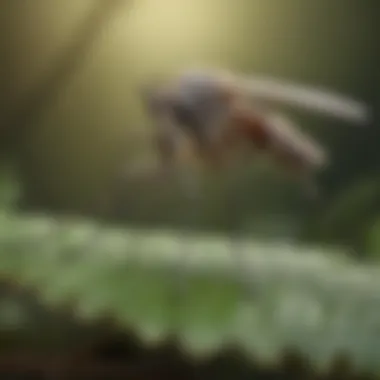
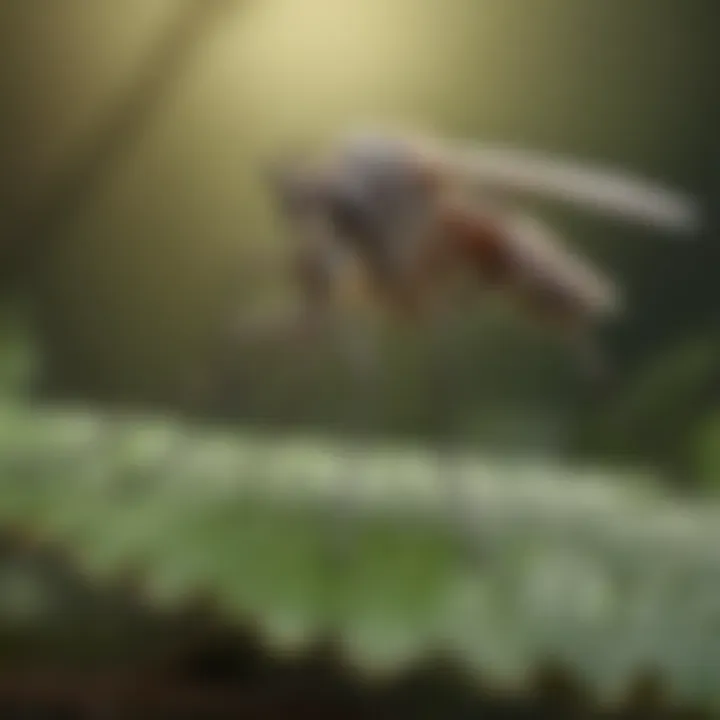
- Types of Chemicals: Various classes of insecticides are available, such as adulticides and larvicides. Adulticides target adult mosquitoes, whereas larvicides are applied to water where mosquito larvae develop.
- Application Techniques: These can include spraying or fogging, with each method having specific benefits. Spraying treatments can cover wide areas, while fogging is more concentrated and can effectively target localized infestations.
- Safety Concerns: It is crucial to observe safety protocols when using chemicals. Proper protective equipment and ensuring no adverse effects on non-target species should always be priorities.
While chemicals play an essential role in quickly reducing mosquito populations, such methods should be complemented with other strategies. Over-reliance on chemical treatments can lead to resistance issues and negatively impact local ecosystems.
Natural and Organic Alternatives
With growing concerns about chemical pesticide use, many homeowners are turning to natural and organic alternatives for mosquito control. These methods provide a safer and more sustainable way to reduce mosquito populations.
- Essential Oils: Oils such as lavender and citronella can repel mosquitoes when applied topically or used in diffusers. Their pleasant scents make them appealing for residential use.
- Biological Controls: Introducing predatory species, such as dragonflies or certain fish that consume mosquito larvae, can reduce their numbers effectively.
- Organic Pesticides: Products derived from natural sources, like neem oil or pyrethrin, can be less harmful to the environment. They can also target mosquitoes effectively while minimizing harm to beneficial organisms.
Choosing natural alternatives appeals to homeowners looking for eco-friendly pest solutions. However, it is essential to approach these methods with realistic expectations, as they may not always provide the immediate results that chemical treatments can achieve.
"Understanding and balancing pest management strategies not only improves the efficacy of mosquito control but also safeguards our environment."
By combining integrated pest management principles with both chemical and natural alternatives, homeowners can create a comprehensive mosquito control plan that addresses their specific needs. This well-rounded approach ultimately leads to a healthier outdoor environment.
Mosquito Shield Services Explained
Understanding the specific services provided by Mosquito Shield is crucial for homeowners seeking effective mosquito control. These services are not only about eradication but also about creating a mosquito-free environment that enhances outdoor living. By focusing on personalized strategies, Mosquito Shield addresses the unique challenges posed by mosquito populations in Northern Virginia.
What to Expect from Professional Services
When engaging with Mosquito Shield, homeowners can anticipate a comprehensive approach to pest management. The process typically begins with a site evaluation where specialists assess the property to identify potential breeding grounds and high-traffic mosquito areas. Following this, they discuss findings with the homeowner, providing insight into the mosquito population and the specific challenges present. The application of targeted treatments often occurs soon after, utilizing specialized equipment to ensure even distribution of the products.
"Professional treatment is not just about spraying chemicals; it’s about understanding the environment and ecology of the property."
In addition to immediate treatment, Mosquito Shield emphasizes the importance of education. They provide practical advice on preventive measures that homeowners can employ, from eliminating standing water to adjusting landscaping habits that might attract mosquitoes. This combination of professionalism and education fosters a partnership aimed at long-term pest management.
Tailored Treatment Plans
Mosquito Shield's strength lies in its ability to offer tailored treatments plans that align with individual household needs. Each property is unique, and that is why a one-size-fits-all solution may not work effectively. The mosquito control program considers factors such as size of the area, local weather patterns, and specific mosquito species prevalent in the region.
The tailored treatment typically includes:
- Initial Assessment: Comprehensive analysis of the landscape.
- Customized Strategy: Developing a pest management plan specific to the property's needs.
- Routine Treatments: Regular scheduling of treatments to maintain a mosquito-free zone.
This planned approach not only addresses current infestations but also proactively reduces future risks. Depending on the season, Mosquito Shield adjusts its methods to deliver optimal results, ensuring that their service remains effective year-round.
Cost and Consultation Considerations
Understanding the costs associated with professional mosquito control can facilitate better decision making. Mosquito Shield provides transparent pricing structures based on the services rendered. Homeowners should consider the scope of their property when discussing potential costs, as larger areas may necessitate more extensive treatments.
An initial consultation is usually provided at no cost, wherein specialists outline respective pricing models based on the evaluation conducted. Factors influencing cost include:
- Size of the property
- Type of treatments selected
- Frequency of visits
Investing in mosquito control can seem like a significant expenditure. However, considering the health risks associated with mosquito-borne diseases, this expenditure can be viewed as necessary for safeguarding family health and comfort during the warmer months. By carefully weighing the cost against the expected quality of service, homeowners can make informed decisions that suit their budget and lifestyle needs.
Do-It-Yourself Pest Control Techniques
Do-it-yourself pest control techniques play a vital role in managing mosquito populations at home. For many homeowners, these methods provide an affordable and accessible means to address infestations without directly relying on professional services. By understanding how to identify breeding sites and employ prevention tactics, homeowners can significantly reduce the likelihood of mosquito-related health issues and improve their outdoor living spaces.
Identification and Prevention Tactics
Identifying potential breeding sites is crucial in mosquito control. Mosquitoes breed in stagnant water, making it important to regularly inspect residential areas for signs of water accumulation. Here are key tactics for identification and prevention:
- Regular inspections of gutters, flower pots, and bird baths help ensure they do not hold water.
- Empty containers that could trap rainwater to prevent breeding. This includes old tires, buckets, or any outdoor items that can collect rain.
- Maintain pools by ensuring proper circulation and frequent cleaning to avoid stagnant water.
- Seal potential breeding areas with mesh screens, especially around water-filled containers.
Furthermore, reducing lush vegetation and shady spots around the yard can discourage mosquito activity, as they prefer humid areas to rest and breed.
Effective DIY Products
A variety of products can be effectively used for mosquito control. Homeowners often seek out both chemical and natural alternatives to combat infestations. Some effective DIY products include:
- Essential oils such as citronella, eucalyptus, and lavender are known to repel mosquitoes. These can be diluted in water and sprayed around the yard.
- Insect repellents containing DEET or Picaridin can be applied directly on exposed skin while outdoors. It is important to follow packaging instructions carefully.
- Larvicides like Bacillus thuringiensis israelensis (Bti) target mosquito larvae in standing water, preventing them from maturing into adults.
- Homemade traps can be created using sugar, water, and yeast to attract and kill adult mosquitoes indoors.
The effectiveness of these products may vary depending on local mosquito populations and environmental conditions.
Limitations of DIY Approaches
While DIY pest control techniques offer many benefits, including cost savings and convenience, they also come with certain limitations:
- Effectiveness can be inconsistent. Some products or methods may not provide adequate control for significant infestations.
- Time investment is necessary for regular monitoring and maintenance, as one-time applications often do not yield long-lasting results.
- Health risks may arise from improper use of chemical products, leading to exposure for residents and pets. Understanding proper application is essential.
- Limited impact on larger infestations or public health concerns. Homeowners may find that professional services are necessary to address widespread problems in their community.
Environmental Impact of Mosquito Control
Understanding the environmental impact of mosquito control methods is critical to creating sustainable solutions. Mosquito populations can be managed without compromising the ecosystem that they inhabit. Effective mosquito control balances human needs and ecological considerations. This is particularly relevant for Northern Virginia, where the interactions between urban development and natural habitats must be carefully navigated.


Eco-Friendly Practices in Pest Management
Adopting eco-friendly practices in pest management is essential to reduce the adverse effects of control methods on the environment. These practices often prioritize preventive measures over reactive ones. Some of the eco-friendly strategies include:
- Biological control: Utilizing natural predators such as fish or insects to manage mosquito populations.
- Habitat modification: Altering landscapes to make them less conducive for mosquito breeding. This includes regular maintenance of water bodies and drainage systems.
- Use of organic repellents: Employing plant-based or organic repellents reduces chemical exposure to the environment.
These strategies aim to minimize harm to beneficial insects and preserve biodiversity while effectively controlling mosquito populations.
Protecting Non-Target Species
One of the biggest challenges in mosquito control is ensuring that non-target species are not negatively affected. Non-target species include beneficial insects like bees, butterflies, and ladybugs. Protecting these species is essential for maintaining ecological balance. Here are some considerations for preventing harm:
- Targeted application: Use techniques that specifically eliminate mosquitoes while sparing other insects. This limits collateral damage to beneficial populations.
- Timing of application: Applying treatments during times when non-target species are less active can minimize exposure.
- Educating the public: Informing homeowners about sustainable practices can lead to community-wide efforts that protect local ecosystems.
"Effective mosquito management should harmonize pest control with environmental integrity."
Overall, environmental considerations in mosquito control cannot be overlooked. Prioritizing eco-friendly practices and protecting non-target species should form the cornerstone of any pest management strategy. By doing so, residents in Northern Virginia can effectively address mosquito issues while also safeguarding their surrounding ecosystems.
Case Studies of Mosquito Shield Applications
Understanding real-world applications of mosquito control is essential for comprehending the efficacy of Mosquito Shield’s services. By examining case studies, we can identify the strengths and impact of their methodologies on various communities. These practical examples highlight the effectiveness of professional mosquito management and provide insights into the advantages of investing in such services.
Successful Community Initiatives
In Northern Virginia, several communities have benefited from Mosquito Shield's integrated pest management solutions. One prominent example includes the collaboration with homeowners associations that sought to reduce mosquito populations in recreational areas. By implementing a targeted spraying program, Mosquito Shield effectively decreased the mosquito numbers significantly in these zones. In just a few weeks, residents noted a marked difference in the comfort level of outdoor activities, such as picnics and sports events.
These community initiatives often involve a collaborative effort between Mosquito Shield and local governance. This partnership not only raises awareness but also facilitates effective communication regarding mosquito control measures. Community members are educated on the importance of regular treatments and engaged in their upkeep, enhancing both participation and results.
Benefits of these initiatives include:
- Improved Quality of Life: Reduction in pests allows for enjoyable outdoor family time.
- Health Protection: Lowered risks of mosquito-borne diseases enhance public health.
- Community Cohesion: Collective efforts foster a sense of unity and shared responsibility.
Personal Testimonials
Feedback from residents who have engaged Mosquito Shield's services reveal insightful perspectives that reflect their satisfaction and relief. Many individuals report noticeable changes in mosquito density after treatment, affirming the company's claims. One homeowner shared,
"Since we started with Mosquito Shield, our backyard has transformed. We can finally enjoy summer evenings without being eaten alive."
Another resident emphasized the professionalism and approach of Mosquito Shield staff. The understanding they provided about the treatment process and expectations made a significant difference in their experience. They remarked,
"The team is always friendly and knowledgeable. They took their time to explain every step and answered all our questions, which was reassuring."
Such testimonials underscore the value of connecting mosquito control services with community needs. Personal accounts not only validate the effectiveness of Mosquito Shield but also create a sense of trust and reliability. This dialogue between service providers and clients shapes better mosquito management practices across the region.
In summary, case studies emphasize not only the applicability of Mosquito Shield’s practices but also their broader impact on community living and individual experiences. The invaluable feedback from local communities and residents exemplifies the company's contributions to enhancing comfort and safety in outdoor spaces throughout Northern Virginia.
Future Directions in Mosquito Control
Understanding the future of mosquito control is essential as it directly impacts public health and quality of life in communities. The threat posed by mosquitoes is evolving, with new technologies and methods emerging to combat infestations more effectively. Homeowners and local governments must stay informed about these innovations and trends to ensure safe and efficient management of mosquito populations. This section examines the intersection between technology and community initiatives in the fight against mosquitoes.
Innovations in Mosquito Management Technology
The advancements in mosquito management technology play a crucial role in the effectiveness of pest control strategies. Various solutions are now available, emphasizing precision and efficiency. One notable innovation is the use of smart traps that can monitor and capture mosquitoes, significantly reducing their populations. These devices often include sensors that identify species, providing valuable data to guides efforts.
Another promising direction is the application of genetic modification. Researchers are developing genetically modified mosquitoes that can mate with wild populations, leading to a decrease in mosquito numbers. This method has shown potential in lab settings, and early field tests are being monitored closely to gauge effectiveness and environmental impact.
Additionally, drone technology is being explored for mapping breeding sites and monitoring mosquito population densities over large areas. Drones provide a bird's-eye view of regions, enabling rapid identification of stagnant water bodies, which are prime breeding grounds. This approach streamlines data gathering, offering targeted solutions with minimal human intervention.
"Investing in advanced technology for mosquito control ensures that communities are better equipped to respond to changing mosquito behaviors and populations."
These innovations are not only about reducing the mosquito populations but also about improving safety for the environment and non-target species. Homeowners can expect to see an increase in eco-friendly solutions that prioritize sustainability while effectively managing mosquitoes.
Trends in Community Engagement
Community engagement is becoming increasingly important in the realm of mosquito control. Awareness campaigns are essential for informing homeowners about prevention tactics. Educational programs encourage residents to eliminate standing water and encourage local governments to promote habitat control measures. This active participation is crucial, as it empowers individuals to take charge of their environments.
Furthermore, there is a growing trend of neighborhood collaborations. Community groups can pool resources for mosquito control, sharing tools like larvicides and traps. Social media platforms often serve as a conduit for sharing success stories and effective practices, helping neighborhoods to learn from each other.
Another significant part of community engagement is the integration of citizen science initiatives. Homeowners can contribute data regarding mosquito sightings and conditions to local health departments. This collaboration enhances surveillance efforts and helps officials strategize better control measures.
Closure
Summary of Key Points
The article has elucidated various key elements related to mosquito control:
- Understanding Mosquito Behavior: Knowledge of their life cycle, feeding habits, and breeding sites is essential in managing infestations effectively.
- Health Risks: Mosquitoes are vectors of several diseases which can impact public health significantly.
- Management Strategies: A combination of Integrated Pest Management, chemical controls, and natural alternatives can provide comprehensive solutions.
- Professional Services by Mosquito Shield: Customized treatment plans are tailored for specific needs, offering efficient and long-lasting results.
- DIY Options and Limitations: While many homeowners may choose to handle pest control themselves, there are important limitations that should be considered.
Call to Action for Homeowners
For homeowners in Northern Virginia, it is imperative to take proactive measures against mosquitoes. Here are specific steps to consider:
- Evaluate your property for breeding sources such as stagnant water.
- Consider professional services like those offered by Mosquito Shield to ensure effective management.
- Stay informed about the latest mosquito control technologies and community initiatives.
- Engage in community efforts to promote mosquito awareness and prevention.
- Take personal responsibility. Keeping your yard tidy can significantly reduce mosquito habitats.
By implementing these actions, homeowners can contribute to a safer and healthier living environment.



